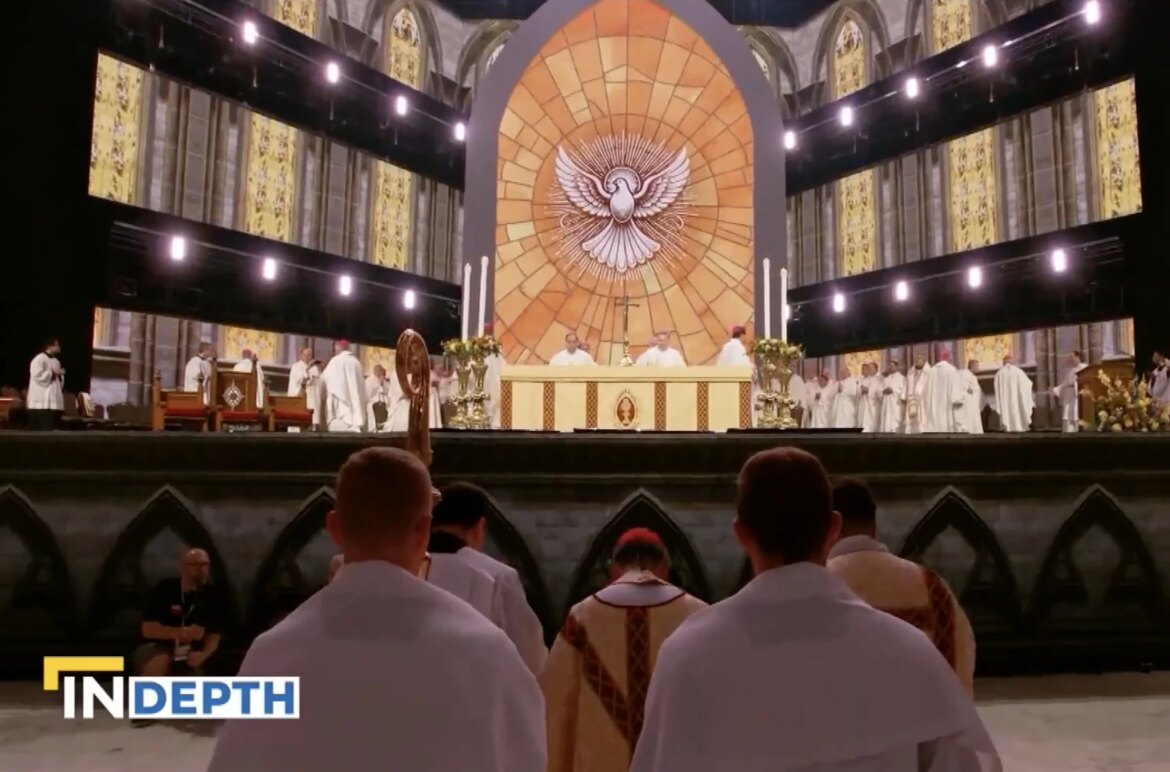Washington, D.C. Newsroom, Oct 18, 2025 /
12:00 pm
Several hymns were temporarily banned last year in the Diocese of Jefferson City, Missouri after being found “to be insufficient in sound doctrine,” with the action raising questions about what music is allowed at the Holy Mass.
In a special report for the Oct. 17, 2025 edition of “EWTN News In Depth,” correspondent Mark Irons explored the subject. Archbishop Shawn McKnight, who implemented the brief ban, told Irons: “I would hope everybody else learns from my mistake.”
McKnight, who was the bishop of Jefferson City at the time, now serves as the archbishop of Kansas City. The controversial ban in question encompassed 12 songs in total, including the popular hymns “I am the Bread of Life” and “All Are Welcome.”
McKnight said the decree was implemented too quickly and without enough discussion among Catholics in the diocese.
Currently, no particular hymns are excluded in the Diocese of Jefferson City, but parishes are required to evaluate Mass music using guidelines that were provided for archdioceses and dioceses across the nation by the U.S. Conference of Catholic Bishops (USCCB).
The USCCB’s 2020 “Catholic Hymnody at the Service of the Church: An Aid for Evaluating Hymn Lyrics” was created to make sure Mass hymns are in conformity with Catholic doctrine. The bishops list a number of specific concerns regarding hymns, including ones with “deficiencies in the presentation of Eucharistic doctrine,” those “with a view of the Church that sees Her as essentially a human construction,” or songs with “an inadequate sense of a distinctively Christian anthropology.”
Kevin Callahan, who serves as the music director at Sacred Heart Parish in Glyndon, Maryland, told Irons: “We believe…the body and blood, soul and divinity of Christ is here at the Mass, in the Eucharist. The songs, of course, should reflect that.”
Callhan explained that he understands why the bishops would create the aid. The bishops “want the right thing to be said in Church, they don’t want the wrong idea to get tossed around.” Callahan said he does believe there are certain hymns that could be misleading.
The ‘pride of place” of Gregorian chant
Over time, Callahan said, Gregorian chant has earned pride of place within the liturgy of the Mass.
This was reflected in the Second Vatican Council document Sacrosanctum Concilium, which explains: “The Church acknowledges Gregorian chant as specially suited to the Roman liturgy.”
Sara Pecknold, a professor of liturgical music at Christendom College, noted that “Gregorian chant, beyond a shadow of a doubt, was developed with and for the liturgy.”
“The Second Vatican council teaches us that the more closely tied the music is to the liturgical action…the more sacred it is,” she pointed out.
Recommendations
If Gregorian chant is unfamiliar to a parish, Pecknold recommends small steps that could be taken. She said: “I would first start with the very simplest chant melodies, for the ordinaries of the Mass.”
(Story continues below)
Subscribe to our daily newsletter
Beyond Gregorian chant, the Second Vatican Council decided that the Church approves “of all forms of true art having the needed qualities, and admits them into divine worship.”
Pecknold explained: “Liturgical music should glorify God and it should sanctify and edify all of us who are present at this great sacrifice.”
Welcoming a diversity of styles
Dave Moore, the music director at the 2024 U.S. National Eucharistic Congress, was in charge of bringing together a wide variety of Catholic musicians from across the country for the event.
Moore said the musical goal of the Congress was to create a unity rooted in Christ, through different styles of music.
“I don’t know how you find unity without diversity,” Moore said. “There’s a lot of people who do things differently than we’re used to, but what we’re looking for is the heart, like are you pursuing the heart of God?”
Archbishop McKnight also noted the need for variety.
“Catholicity means there’s a universality to who we are, that we’re not of just one kind or one culture, but there’s a diversity of charisms and a diversity of styles,” he said. “The fact that there are different ways of entering into the mystery of Christ, actually increases the unity we have, otherwise we’re just a church of some, and not the Church of all.”
Music is “often associated with memories and emotions, too,” he said. “That’s a part of our celebration of the Eucharist. It’s not just a thing of the mind. It’s not just a doctrinal assent. It’s also a movement of the heart and ultimately it’s active prayer.”
“Hymns that are liked by the people are a good choice, but it’s also important that they convey the Catholic faith,” McKnight said. “It’s about discernment of the will of God and what the Holy Spirit wants.”


